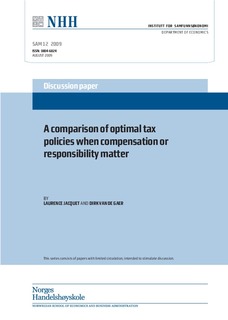| dc.contributor.author | Jacquet, Laurence | |
| dc.contributor.author | Van de gaer, Dirk | |
| dc.date.accessioned | 2009-09-24T13:32:54Z | |
| dc.date.available | 2009-09-24T13:32:54Z | |
| dc.date.issued | 2009-08 | |
| dc.identifier.issn | 0804-6824 | |
| dc.identifier.uri | http://hdl.handle.net/11250/163172 | |
| dc.description.abstract | This paper examines optimal redistribution in a model with high and low-skilled individuals with heterogeneous tastes for labor, that either work or not. With such double heterogeneity, it is well known that traditional Utilitarian and Welfarist criteria suffer serious flaws. As a response, several
other criteria have been proposed in the literature. We compare the extent to which optimal
policies based on different normative criteria obey the principles of compensation (for differential
skills) and responsibility (for preferences for labor). Unsurprisingly, the criteria from the social
choice literature perform better in this regard than the traditional criteria, both in first and second
best. More importantly, these equality of opportunity criteria push the second best policy away
from an Earned Income Tax Credit and in the direction of a Negative Income tax. | en |
| dc.language.iso | eng | en |
| dc.publisher | Norwegian School of Economics and Business Administration. Department of Economics | en |
| dc.relation.ispartofseries | Discussion paper | en |
| dc.relation.ispartofseries | 2009:12 | en |
| dc.subject | optimal income taxation | en |
| dc.subject | equality of opportunity | en |
| dc.subject | heterogeneous preferences for labor | en |
| dc.title | A comparison of optimal tax policies when compensation or responsibility matter | en |
| dc.type | Working paper | en |
| dc.subject.nsi | VDP::Samfunnsvitenskap: 200::Økonomi: 210::Samfunnsøkonomi: 212 | en |
